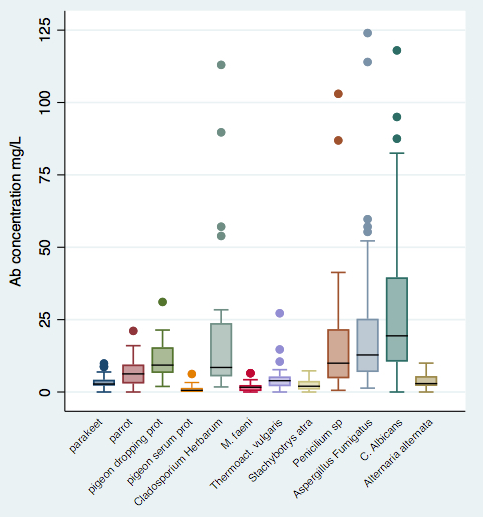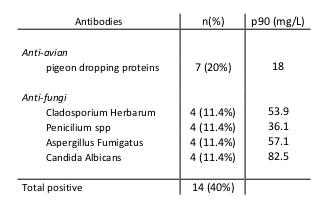Session Information
Date: Tuesday, November 12, 2019
Title: RA – Diagnosis, Manifestations, & Outcomes Poster III: Comorbidities
Session Type: Poster Session (Tuesday)
Session Time: 9:00AM-11:00AM
Background/Purpose: Rheumatoid arthritis associated interstitial lung disease (RA-ILD) is an extra-articular manifestation with a poor prognosis. In clinical practice, to establish such a diagnosis requires to rule out other causes of ILD.
Usual interstitial pneumonia is the most common high-resolution computed tomography pattern found in RA-ILD and is indistinguishable from that of chronic hypersensitivity pneumonitis, an immune-mediated ILD that can result from the exposure to several widely recognized antigens.1 To date, it is not known whether the determination of exposure to environmental factors known to cause lung fibrosis, such is the case of avian or fungi antigens, by measuring their antibodies (Ab) plays a role both in diagnosis and further management of patients with RA-ILD.
Our aim was to describe the frequency of significant levels of AA and AF Ab in a cohort of patients with RA-ILD.
Methods: We performed a cross-sectional study including all patients with RA according to the ACR 2010 classification criteria diagnosed with ILD from June 2014 to March 2019 on an ILD multidisciplinary committee of a tertiary referral centre.
All patients were evaluated using a standardized laboratory protocol including: red and white blood cell count, kidney and liver function tests, c-reactive protein, eritrosedimentation rate, rheumatoid factor (RF), antinuclear Ab, extractable nuclear antigens (ENA), ACPA (CCP2), anti-avian (AA) and anti-fungi (AF) Ab.
AA included specific IgG Ab against parakeet and parrot feathers and pigeon droppings and serum proteins. AF included Micropolyspora faeni, Thermoactinomyces vulgaris, Stachybotrys atra, Penicillium sp, Cladosporium herbarum, Aspergillus fumigatus, Candida albicans and Alternaria alternata Ab. Both groups were assessed by ImmunoCAP® IgG Specific (Thermo Fisher Diagnostics). Since there are no validated cut-off levels, we defined significant (positive) levels when above the p90 of the cohort’s distribution for the AA or AF Ab with the highest frequency.
Results: 35 patients were included; their main demographic and clinical features are shown in table 1. 3 ENA-positive cases were found; 2 of them had high levels of RF and ACPA titers and the remaining had erosive disease.
Antibodies against C. albicans, A. fumigatus, Penicillium spp, C. herbarum, and pigeon droppings proteins presented the highest levels within the cohort. A summary of the distribution of all Ab is shown in Figure 1.
Overall, 14 (40%) of patients had significant (positive) levels either AA or AF Ab according to our definition. 2 patients had double positivity, 2 had triple and 1 presented quadruple positivity; frequencies of each of the most representatives Ab are shown in table 2. Of note, 5 out of 14 patients with reported positive Ab levels were not aware of any environmental exposure on anamnesis.
Conclusion: 40% of patients within our cohort presented significant levels of either AA or AF antibodies according to our strict definition. Adding these measurements to the routine work-up of RA-ILD could help the multidisciplinary team’s diagnostic decisions. Further research is needed to determine their role in RA-ILD outcomes.
References
1. Morell F, et al. Lancet Respir Med. 2013;1(9):685-94.
IQR: Interquartile range; CU: Chemiluminescence Units; IU: International Units; UIP: Usual Interstitial Pneumonia; NSIP: Non-specific Interstitial Pneumonia; COP: Cryptogenic Organising Pneumonia; RB-ILD: Respiratory Bronchiolitis associated ILD; MTX: Methotrexate; LEF: Leflunomide; HCQ: Hydroxychloroquine; ABA: Abatacept; TCZ: Tocilizumab.
M. faeni: Mycropolyspora faeni; Thermoact. vulgaris: Thermoactinomyces vulgaris
To cite this abstract in AMA style:
Rodriguez-Garcia S, Castellanos-Moreira R, Hernández-González F, Perez A, Francesqui J, Cuerpo-Cardeñosa S, Ruiz-Esquide V, Benegas M, Ramírez J, Lucena-Pozo C, Agustí C, Boada M, Ruiz E, Viñas O, Prieto-González S, Sanmarti R, Espinosa G, Pascal M, Gomez-Puerta J, Sánchez M, Sellares J. Exposure to Avian and Fungal Antigens in Patients with Rheumatoid Arthritis-AssociatedInterstitial Lung Disease: Something to Keep in Mind [abstract]. Arthritis Rheumatol. 2019; 71 (suppl 10). https://acrabstracts.org/abstract/exposure-to-avian-and-fungal-antigens-in-patients-with-rheumatoid-arthritis-associatedinterstitial-lung-disease-something-to-keep-in-mind/. Accessed .« Back to 2019 ACR/ARP Annual Meeting
ACR Meeting Abstracts - https://acrabstracts.org/abstract/exposure-to-avian-and-fungal-antigens-in-patients-with-rheumatoid-arthritis-associatedinterstitial-lung-disease-something-to-keep-in-mind/



